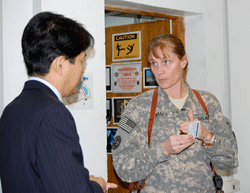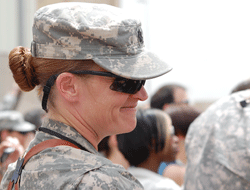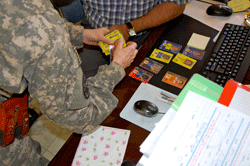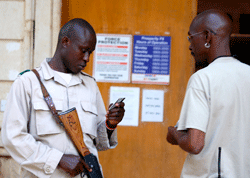Badge Wars
The woman who controls access to Baghdad's Green Zone is one of the most powerful Americans in Iraq.
BAGHDAD, Iraq—Army Lt. Col. Kimberly Johanek is one of the most powerful Americans left here. Not even the U.S. ambassador or the four-star commander in charge of U.S. forces has the authority to do what she does.
One recent spring afternoon, Johanek, a sociology professor on her second deployment to Iraq with the Idaho National Guard, greeted Hai-Kwang Lee, deputy chief of mission for the Korean Embassy, at her tiny office, a white-tiled converted bathroom at FOB Prosperity in the Green Zone, now officially called the International Zone. (Most people still refer to these palatial, bomb-damaged former stomping grounds of Saddam Hussein as the Green Zone, its original name under the U.S.-led occupation government.)
Lee showed Johanek a blue badge, a coveted color in the multi-tiered system the Americans created to grant access to the Green Zone, the 3.8-square-mile walled compound in the center of Baghdad that houses the Iraqi government and the international diplomatic quarter. The badge was new, recently issued by Johanek's office, and will not expire until Dec. 31, 2011, when U.S. troops are scheduled to depart under the current agreement with the Iraqi government.
So what was the problem? Johanek knew it before Lee opened his mouth, because she's fielded daily calls like this since she assumed control of badging in November 2010. She is now advising the Iraqis on how to deal with their own issues of access since they regained control of the Green Zone checkpoints almost a year ago. The Iraqi government has a new, separate badge for entering the Green Zone. The U.S. military still controls access to its bases, some of which are inside the Green Zone, and the U.S. State Department controls access to the embassy, also in the Green Zone. (We'll come back to this complicated tangle of plastic in a moment.)
"They took away the PX," Lee said, pointing to the badge. In the movie version of this encounter, he would hang his head in shame or sorrow. But this isn't the movie version. Lee looked Johanek straight in the eye and said, "I want to explain why the PX is important to us. Our people eat a lot of meat. The Arab people only eat chicken, and the quality isn't very good. It is very difficult."
Johanek responded with a rehearsed answer, delivered to countless diplomats, contractors, and, yes, it must be noted, journalists. (Johanek refused to budge when the military's top spokesman recently went to bat for a Western reporter in Baghdad who wanted to shop at the PX. In the spirit of full disclosure, and because I'm no hypocrite, I should say that I've purchased jars of salsa, Chex Mix, Runner's World magazines, and a pillow or two from the PX in the years I've lived and reported from Iraq. But these days the only way journalists can access a PX on a military base is with travel orders issued for embedding with the military. I am crunching on Cheez-Its purchased at the PX as I write this. However, these are embedded Cheez-Its, not wasta Cheez-Its.)
"It's been this field of dreams for foreign embassies," Johanek said. "We built it. They used it. But if we were in Germany, you wouldn't go to the military or to the embassy for things. You'd find them on your own."
Lee looked a bit defeated when he left with his blue badge that won't get him—or his chef—into the PX.
Johanek is unapologetic. "Our badges are being used for access privileges," she said. "I know it. I see it every day," she said, noting that it has resulted in a pervasive culture of what she calls "badge wasta." The higher their rank and position, the more indignant many officials in Iraq seem to get if they are stopped at a checkpoint and not simply waved through.
Johanek is not only responsible for curbing the abuses that became entrenched in the system, she is also trying to guide the Iraqis not to make the same mistakes. It's tough. The Americans are essentially saying, Look, don't do it the way we did it, because our way created a system of privilege that left your people outside the gate, and not just metaphorically, and they stayed outside the gate until they learned how to manipulate our system. In fact, they are now so good at it that if you simply adopt our system, you will inherit our mess.
"We created it," Johanek said, "and now we're trying to get them to work their way out of it."
The Iraqis are issuing badges at a small office also in the Green Zone. The "GOI badge"—GOI stands for Government of Iraq—uses the same color-coded system for access as the USF-I—short for United States Forces Iraq—badges. At the bottom of the tier is the red badge, which indicates the holder has not be vetted for security and has to be escorted. A worker might have this kind of badge. Orange is the next level, which means the holder has been vetted but still has to be escorted. Yellow badge holders can escort other people. Blue and green badges offer the most privileges but not necessarily access to military dining facilities or the PX, the "post exchange" stores that sell towels, food, underwear, American brands of toiletries, food, magazines, sunglasses, souvenirs, and electronics. It's basically a very tiny Walmart, with lots of camouflage.
"The GOI badge system is replicated off of ours, so the colors mean basically the same thing," Johanek told me. "Access into the IZ is much easier with a blue or green badge—both GOI and USF-I, which is one of the reasons they are highly sought after."
Johanek made a visit to the GOI badge office one morning to talk to Bashar Al Saraj, security coordinator for GOI badging. Saraj and Johanek are on very friendly terms. Most people are with Johanek, a personable mother of two with an easy smile, a scholarly view of the world, and an infantryman's mouth.
"First, I'm very upset," Saraj told Johanek before she had even settled in her chair. "They confiscated one of our badges."
Growing Pain No. 1: The new Iraqi badges look similar to the USF-I badges, but they are different enough that a security officer thought it was fake.
Johanek is trying to encourage the Iraqis to use biometrics, which match fingerprints or iris scans against a database. It is a highly reliable but expensive identifier that embeds a chip in a badge that can be matched against information stored in a database. The U.S. military uses such biometrics on its badges. But the Iraqis only have five biometric-badge readers, and neither government is willing to turn over their databases to read each other's badges.
"You can fake a fraudulent badge all you want, but you can't match the chip," Johanek said, trying to encourage Saraj. He said he's content with changing the watermark on the lamination to help differentiate the badges.
Growing Pain No. 2: The Americans are only advising and assisting the Iraqi government, which means the Iraqis ultimately get to decide the system that's best for them.
During the meeting, Saraj also asked Johanek why the U.S. military had issued a top clearance badge to an individual who works for an American contractor.
"He's related to al-Qaida," Saraj said, handing the badge back to Johanek. "We went to his residence. We asked around about him. Then we ambushed him to get your badge back."
"Wow, you're good," Johanek told Saraj. "That's impressive."
Johanek later said that the Iraqis have been able to conduct better screening in part because they can do what the Iraqi badging office did. They went to the man's house, and they talked to his neighbors.
While Johanek and Saraj were visiting, an Iraqi came to the office and asked about access for about 300 Turkish laborer who are working on a construction site near the U.S. Embassy in the Green Zone. Johanek advised Saraj that the workers did not need badges if they would be living in the Green Zone and didn't need to come and go. He agreed.
"But my manager, he will need the blue badge," the man said.
Both Saraj and Johanek laughed.
"What color is your badge?" Johanek asked the man.
"Yellow," he told her.
"Is it Iraqi-wide?" she asked.
"Yes," he replied, showing her.
"Do you need access outside of Baghdad," she asked him.
He grinned. "No."
"No, you don't," Johanek agreed. "You didn't need that badge."
Some of Johanek's vigilance is about the cost of printing badges, which she estimates to be about $40 each. The Combined Press Information Center, which controls press access to the military, has printed more than 27,000 of them.
Johanek said she couldn't even begin to estimate how many badges USF-I has printed.
"The number would be staggering," she said. "In a [one-]year time frame just here at FOB Prosperity we issue approximately 10,000. If you were to apply that number Iraqi-wide and also look at the fact that from 2004 to 2009 we issued International Zone badges to every Iraqi who lived or worked within the IZ, I would cringe to think of the total number of badges printed and issued."
The issue of access to the Green Zone has been a sore point for Iraqis during the years since the 2003 U.S.-led invasion. Even Iraqis with legitimate business inside the Green Zone often have trouble getting in.
"The harassment in the inspection at the entry and exit of the Green Zone is unbearable," Samir Atwan said in Arabic. "They insult the person. After the inspection, they demand that the person opens their mobile phone and removes the battery, and they ask for two forms of identification."
Although the checkpoints to the Green Zone have been routinely targeted, making them some of the most dangerous in Iraq, there have been few attacks in recent years. Still, Atwan said security will improve after the Americans leave, because even if the Americans aren't controlling the checkpoints anymore, the anger is directed at them.
Salam al-Obeidi works inside the Green Zone and said he typically does not have problems getting to his job. He said U.S. forces used to harass Iraqis trying to enter, but that has gone away now that Iraqi troops guard the entrances. But he said the Iraqi troops don't necessarily make him feel safer.
"I'm afraid of a security breach after the departure of U.S. troops," he said in Arabic. "The Iraqi troops might be too lenient."
Saraj said he aims to make it easier for Iraqis to get into the Green Zone but "not easier for the terrorists. Easier for the people who work here." He plans to do that with an aggressive screening process, he said.
The United States currently has 46,000 troops on the ground in Iraq. The troops remaining since combat forces departed last August are required to depart by the end of this year under a security agreement with the Iraqi government. That doesn't mean there will be no American soldiers left in Iraq. An unspecified number will remain to support the U.S. Embassy mission, to provide security for its activities, and to support the Office of Security Cooperation. To the consternation of U.S. military leaders in Iraq and some strategists in Washington, Iraqi leaders still have not said whether they will request that some American troops stay beyond Dec. 31, as some, including Prime Minister Nouri al-Malaki, have hinted they might.
If the current timeline sticks, however, that means that after Jan. 1, 2012, there will be three types of badges: Department of State/Department of Defense, Office of Security Cooperation, and Government of Iraq.
After Dec. 31, 2011, anyone who does not have the new GOI badge will not be able to enter the Green Zone. The USF-I badges will no longer grant access, a point that Johanek said not enough people in Baghdad understand or are concerned about.
"It's not just the Iraqis," she said. "A lot of NGOs are going to be in for a rude awakening if they aren't part of that process. A lot of people who had enjoyed access are not getting in."



